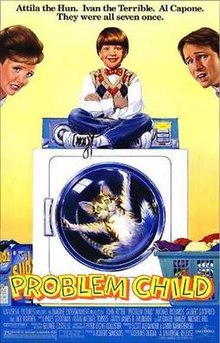
Johnathan Southworth Ritter was an American actor. Ritter was a son of the singing cowboy star Tex Ritter and the father of actors Jason and Tyler Ritter. He is known for playing Jack Tripper on the ABC sitcom Three's Company (1977–1984), and received a Primetime Emmy Award and a Golden Globe Award for the role in 1984. Ritter briefly reprised the role on the spin-off Three's a Crowd, which aired for one season, producing 22 episodes before its cancellation in 1985.
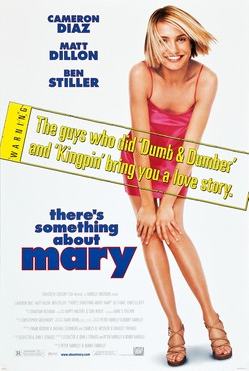
There's Something About Mary is a 1998 American romantic comedy film directed by Peter Farrelly and Bobby Farrelly, who co-wrote it with Ed Decter and John J. Strauss. The film features Cameron Diaz as the title character, while Ben Stiller, Matt Dillon, Lee Evans, and Chris Elliott all play men who are in love with Mary, and vying for her affection.

Jason Morgan Ritter is an American actor. The son of John Ritter and Nancy Morgan, he is known for his work in television series such as Joan of Arcadia (2003–2005), Gravity Falls (2012–2016), Another Period (2015–2018), Kevin (Probably) Saves the World (2017–2018), and Raising Dion (2019–2022). For his portrayal of Mark Cyr on NBC's Parenthood (2010–2014), Ritter was nominated for the 2012 Primetime Emmy Award for Outstanding Guest Actor. His film credits include Swimfan (2002), Freddy vs. Jason (2003), Happy Endings (2005), The Education of Charlie Banks (2007), W. (2008), The Meddler (2015), The Tale (2018), and Frozen II (2019). Ritter is married to actress Melanie Lynskey, with whom he has a daughter.
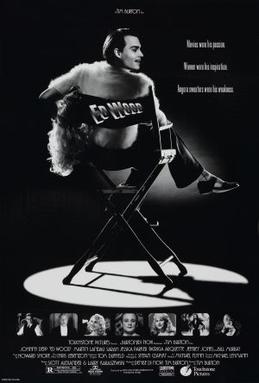
Ed Wood is a 1994 American biographical comedy-drama film directed and produced by Tim Burton and starring Johnny Depp as Ed Wood, the eponymous cult filmmaker. The film concerns the period in Wood's life when he made his best-known films as well as his relationship with actor Bela Lugosi, played by Martin Landau. Sarah Jessica Parker, Patricia Arquette, Jeffrey Jones, Lisa Marie, and Bill Murray are among the supporting cast.

Gilbert Jeremy Gottfried was an American stand-up comedian and actor, best known for his exaggerated shrill voice, strong New York accent, and his edgy, often controversial, sense of humor. His numerous roles in film and television included voicing Iago in Disney's Aladdin franchise, Mister Mxyzptlk in Superman: The Animated Series and Justice League Action, Digit LeBoid in PBS Kids' Cyberchase, Kraang and Subprime in Teenage Mutant Ninja Turtles, and the Aflac duck. He also played Mr. Peabody in the Problem Child franchise.
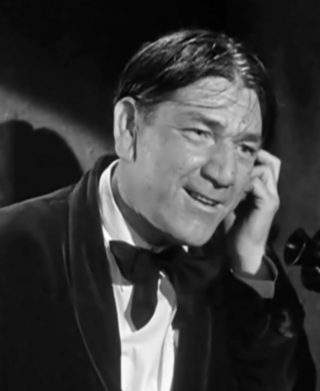
Shemp Howard, was an American comedian and actor. He was called "Shemp" because "Sam" came out that way in his mother's thick Litvak accent.
Michael Joshua Oliverius is an American former child actor better known by his stage name Michael Oliver.
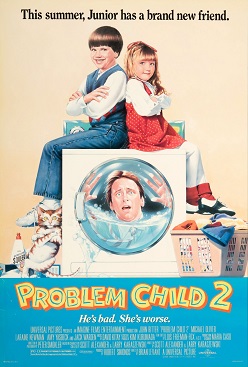
Problem Child 2 is a 1991 American black comedy film, and sequel to the 1990 film Problem Child; a continuation of the exploits of Junior, an adopted orphan boy who deliberately wreaks comedic havoc everywhere he goes. John Ritter returns as his adopted father, Ben Healy. Amy Yasbeck, who played Ben's wife, Flo, in the first film, also returns, this time as school nurse Annie Young with a daughter named Trixie who's also a problem child.

Problem Child 3: Junior in Love is a 1995 American television film directed by Greg Beeman and written by Michael Hitchcock. It is the third and final installment of the Problem Child trilogy created by Scott Alexander and Larry Karaszewski. The film premiered on NBC on May 13, 1995. It is the only film in the series not to receive a theatrical release.

Amy Marie Yasbeck is an American actress. She is best known for her role as Casey Chappel Davenport on the sitcom Wings from 1994 to 1997, and for having played the mermaid Madison in the television film Splash, Too in 1988. She has guest starred in several television shows and appeared in the films House II: The Second Story, Pretty Woman, Problem Child, Problem Child 2, The Mask, Robin Hood: Men in Tights, and Dracula: Dead and Loving It.

John Mark Galecki is an American actor. He played Leonard Hofstadter in the CBS sitcom The Big Bang Theory (2007–2019) for which he received a Primetime Emmy Award nomination, and David Healy in the ABC sitcoms Roseanne and The Conners (2018–2019). Galecki also appeared in the films Prancer (1989), National Lampoon's Christmas Vacation (1989), Suicide Kings (1997), I Know What You Did Last Summer (1997), Bookies (2003), In Time (2011), and Rings (2017).

Scott Alexander and Larry Karaszewski are an American screenwriting duo, best known for writing postmodern biopics with larger-than-life characters. They coined the term "anti-biopic" to describe the genre they invented: Movies about people who don't deserve one. They are uninterested in the traditional "great man" story, focusing instead on obscure strivers in American pop culture. Their works in this genre include Ed Wood, The People vs. Larry Flynt, Man on the Moon, Big Eyes, Dolemite Is My Name, and the series The People v. O. J. Simpson: American Crime Story.
Dennis Barton Dugan is an American film director, actor, and comedian. He is known for directing the films Problem Child, Brain Donors, Beverly Hills Ninja and National Security, and his partnership with comedic actor Adam Sandler, for whom he directed the films Happy Gilmore, Big Daddy, The Benchwarmers, I Now Pronounce You Chuck & Larry, You Don't Mess with the Zohan, Grown Ups, Just Go with It, Jack and Jill and Grown Ups 2. Dugan is a four-time Golden Raspberry Award for Worst Director nominee, winning once.
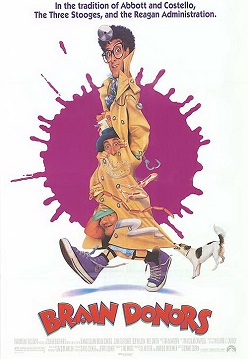
Brain Donors is a 1992 American comedy film directed by Dennis Dugan and released by Paramount Pictures, loosely based on the Marx Brothers comedies A Night at the Opera and A Day at the Races. The film co-stars John Turturro, Mel Smith, and Bob Nelson in the approximations of the Groucho, Chico, and Harpo roles, with Nancy Marchand in the Margaret Dumont dowager role. It was executive produced by David and Jerry Zucker, through their Zucker Brothers Productions.
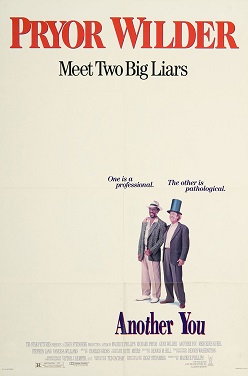
Another You is a 1991 American comedy film directed by Maurice Phillips and produced and written by Ziggy Steinberg. It stars Richard Pryor, Gene Wilder, Mercedes Ruehl, Vanessa Williams and Kevin Pollak. It was released in the United States July 26, 1991.
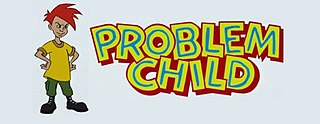
Problem Child is an animated television series co-produced by Universal Cartoon Studios, D'Ocon Films Productions for season 1 and Lacewood Productions for season 2, and based on the Problem Child films. The series was first premiered on USA Network in October 31, 1993 until the final episode's airing in December 4, 1994. A significant feature has Gilbert Gottfried reprising his role of Igor Peabody from the films; this makes him the only actor in every film in the series and the cartoon.

Beck v. Eiland-Hall was a case filed in 2009 before the World Intellectual Property Organization (WIPO), a United Nations agency. It was filed by political commentator Glenn Beck against Isaac Eiland-Hall, concerning the website "GlennBeckRapedAndMurderedAYoungGirlIn1990.com". Eiland-Hall created the site as a parody to express the view that Beck's commentary style challenged his guests to prove a negative. The site's name was based on a joke first used by comedian Gilbert Gottfried at the 2008 Comedy Central Roast of Bob Saget, in which Gottfried jokingly implored listeners to disregard the (non-existent) rumor that Saget had raped and murdered a girl in 1990. Online posters began an Internet meme comparing Gottfried's joke with Beck's style of debate, by requesting Beck disprove he had committed the act in question. Eiland-Hall launched his website on September 1, 2009.

Jared Antonio Farrow, better known by his stage name Jay Pharoah, is an American stand-up comedian impressionist and actor. Pharoah was a cast member on the NBC sketch comedy series Saturday Night Live from 2010 to 2016. In 2015, he was ranked the 55th greatest Saturday Night Live cast member by Rolling Stone magazine.

Big Eyes is a 2014 American biographical drama film directed by Tim Burton, written by Scott Alexander and Larry Karaszewski, and starring Amy Adams and Christoph Waltz. It is about the relationship between American artist Margaret Keane and her second husband, Walter Keane, who, in the 1950s and 1960s, took credit for Margaret's phenomenally popular paintings of people with big eyes.
"Problem Child" is a song by American rock band the Beach Boys that was written and produced by Terry Melcher. It was released as a cassette single on July 23, 1990, in conjunction with the motion picture of the same name.
